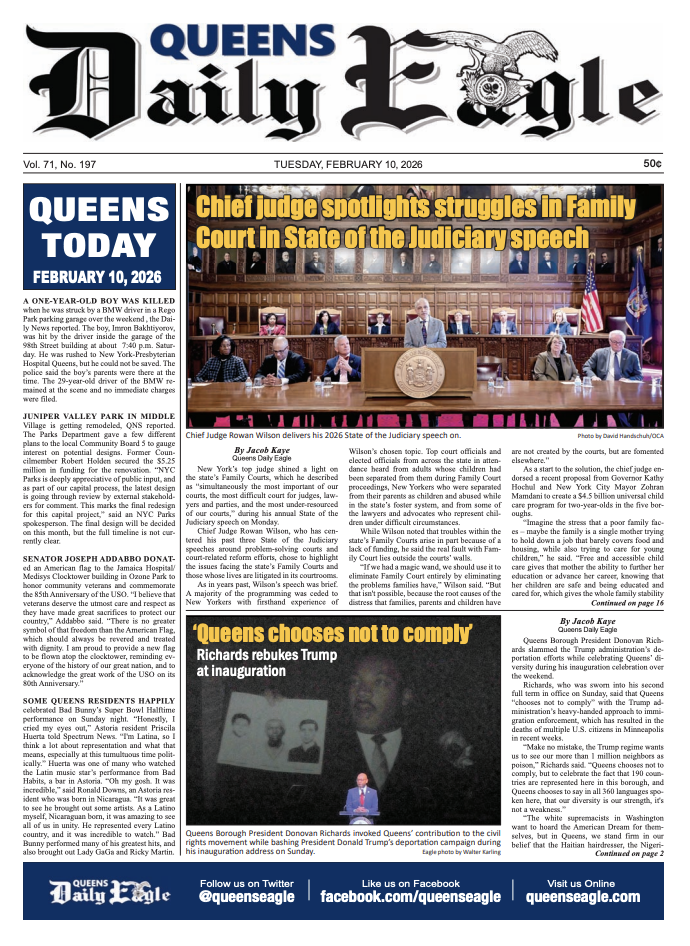Advocates denounce NYCHA hearing on public housing reform
/A group of NYCHA residents and advocates announced their opposition to a plan from officials they claim is too similar to one they already rejected. AP Photo Mark Lennihan
By Rachel Vick
New York City Housing Authority residents and advocates released a letter Monday in opposition to a scheduled public comment period on a plan to reform NYCHA that the groups say has already been shut down by the community.
The public comment period for the Draft Significant Amendment is slated to open July 27, but advocates say that the proposed plan is based on the Blueprint Plan, which was withdrawn following opposition. The groups added that the public comment period was rushed and that residents are largely unaware of the details of the plan or now face barriers to participating in the hearing.
“It is disrespectful to NYCHA tenants and stakeholders, and does not show a faithful or genuine interest in tenant feedback or democratic participation by NYCHA,” organizers wrote.
The letter was signed by Save Section 9, Justice For All Coalition CAAAV Organizing Asian Communities, Sunrise NYC, Ojala Threads Inc., New York Communities for Change, Holmes-Isaac Coalition, Gun Hill Houses, St. Mary's Park Houses E.Roosevelt Resident Council and Brooklyn West Council of Presidents.
Save Section 9 Co-lead organizer Ramona Ferreyra, a resident of Mitchel Houses in the Bronx, said that organizers only heard about the hearing after learning of an email sent to local elected officials “so the average tenant doesn't know.”
“It's a sham,” she said. “For the last year we have made it clear we do not support Blueprint.”
“When the plan was born… we communicated to the federal monitor that we would not accept it; obviously the federal monitor and NYCHA leadership continued to ignore tenants and undermine our ability to participate in what should be a democratic process,” Ferreyra added. “They're ignoring the process, ignoring our right to participate in the process and most infuriating is that since December at every stage of the plan we said no.”
In addition to claims that the hearing format offers limited access for technologically-challenged residents who would otherwise participate, they say that instead of drawing on a plan that faced significant opposition, the housing authority should prioritize resident input — which they have allegedly failed to do.
Before pandemic gathering restrictions, public meetings would be held in each borough, but according to organizers the public comment period will only be open until July 30.
A spokesperson for NYCHA said that around 400 people have signed up to attend the public comment period, an increase of about 300 when compared to in-person meetings. The spokesperson added that hundreds of thousands of calls and emails went out to residents informing them of the meeting, in addition to notices in their rent bills and flyers hung throughout buildings.
“The goals in the draft FY 2022 Annual Plan are based on the FY 2020 Annual and Five-Year Plan, which was submitted to HUD on October 18, 2019, before the Blueprint for Change was introduced,” the spokesperson said. “The Blueprint is mentioned in the Executive Summary in order to provide residents and the public with an update on the status. The FY 2022 Plan does not include any actions to create the Public Housing Trust.”
When it was first proposed, the plan would include re-designating NYCHA — the largest public housing authority in the country — from section 9 “public housing” to section 8 “low income housing” through the creation of a public benefit corporation .
“Because we're the biggest, we refuse to fall,” Ferreyra said. “We will not leave section 9 and we expect Congress to fund section 9 as aggressively as section 8. My generation believes in the promise of NYCHA and will keep fighting and educating our neighbors to make sure public housing is safe.”
Stan Morse, the lead organizer at Justice for All Coalition — which represents western Queens complexes including the sizeable Queensbridge and Ravenswood Houses — said that the risk of NYCHA going under once the oversight shifts outweighs any benefits that might come from the system overhaul as proposed.
He said that NYCHA’s efforts to continue the process with the tenant population out of the loop “is completely unfair.”
“They’re already notorious for bad management,” Morse said. “We believe the best solution is to get money from [the Department of Housing and Urban Development] to fully fund NYCHA. We want residents at the table helping to manage money and make sure it goes where it needs to — that’s a key component.”
This story was updated to include a comment from NYCHA at 6:30 p.m. on Monday, July 26, 2021.




